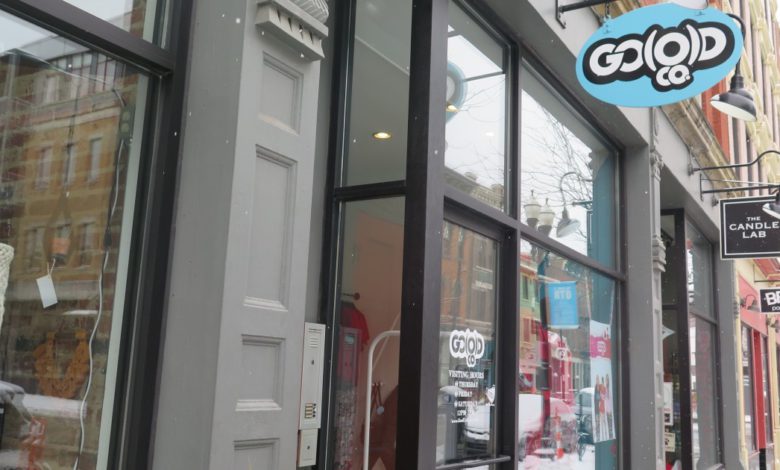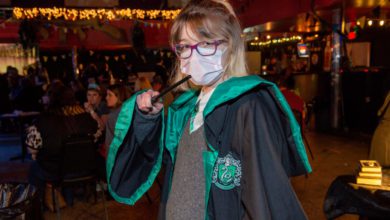
CINCINNATI — This story was reported in partnership with The Herald.
About this time last year, Donny Harper opened his new Go(o)d Company Apparel store on Vine Street in Over-the-Rhine.
Before he could schedule an official grand opening, COVID-19 hit.
“This is a location that I’ve been, like, praying for,” said Harper, who launched his clothing brand in 2014 and had a shop on Race Street before moving to his new location. “We opened the doors at the beginning of March and, you know, the pandemic was stirring. And in the middle of March, they said, ‘Shut it down. We’re shutting down everything.’ And so it was super disappointing and disheartening.”
His store stayed closed until July 1, 2020, but that didn’t stop Harper.
He ramped up marketing on social media, focused his efforts on building online sales and designed face masks and other new products to sell, he said. He also took advantage of the help available to him. He got a Paycheck Protection Program loan, a Facebook loan and a PUSH Grant, designed specifically to help the region’s minority entrepreneurs persevere.
“Those funds really helped to sustain our business and help us continue to thrive and get more merchandise,” he said. “And to continue to market our brand to the public to let people know that we were still – we were still breathing.”
Lucy May | WCPO
Weathering the turmoil of the coronavirus pandemic has been especially difficult for African American entrepreneurs like Harper. Nearly a year into the COVID-19 economic crisis, WCPO 9 and the Cincinnati Herald teamed up to report on how the region’s Black-owned businesses are faring.
Black-owned businesses have an economic impact of $1.44 billion in Greater Cincinnati, according to a January 2021 study by the University of Cincinnati Economic Center. The 800 businesses included in the study support more than 8,600 jobs with earnings of more than $542 million, and they generate millions of dollars in tax revenue, the analysis found.
That makes the health of Black-owned businesses important to everyone, and the past year has threatened many of them, said Eric Kearney, the president and CEO of the Greater Cincinnati and Northern Kentucky African American Chamber of Commerce.
“The pandemic has really had a devastating effect on Black-owned businesses and on our members,” Kearney said. “Some national surveys say that 40% of African American-owned businesses went under during this pandemic. Our statistics say that it’s about 30% in the Cincinnati marketplace.”
RELATED: Black-owned businesses feeling weight of difficult 2020
That amounts to as many as 300 local businesses that have closed permanently, Kearney said.
“Typically they’re smaller businesses, but they’re still just as important,” he said. “They still feed a family.”
‘You have to overcome those moments’
In Bond Hill, Davis Cookie Collection is feeding more than the Davis family.
The cookie business opened its first brick-and-mortar location on Reading Road last year after months of delays caused by the coronavirus pandemic.

Lucy May | WCPO
Contractors working on the storefront experienced delays getting the materials they needed, and the electrician working on the project had trouble getting the supplies he needed, too, said Christina Davis, the company’s owner and CEO.
“What could have been a short turnaround time for us to get open took a long time,” she said. “We looked at this place in November 2018. We signed our lease in August 2019, and we didn’t get to open until Oct. 10 of 2020.”
Those delays forced Davis to get more creative than ever.
She lost important in-person marketing opportunities, such as the weekly pop-up location she used to operate at Jungle Jim’s. But Davis developed new business strategies that have helped her company grow.
“We really had to re-evaluate and pivot our business in a different direction,” she said. “Now we’re really targeting corporations where we can sell them individualized bags of cookies that they’ve been ordering for their employees. We’ve been shipping nationwide. A lot of different companies -- P&G to name one of them -- they order a lot of cookies for their employees.”
Davis also thought of new ways to make her shop stand apart once it did open, developing her “create a dozen” concept. Customers pick from a variety of toppings that get mixed into cookie dough and baked while they wait. The shop also sells ice cream and allows customers to customize ice cream sandwiches by selecting their own cookie and ice cream combination.
RELATED: Cookie shop opens with sweet new concept
“I do a lot of marketing research. Like, most times I’m up really late at night researching on how we can pivot our business, what we can innovate,” she said. “When the pandemic first happened and all the businesses were shut down, as well as ourselves, that was my moment to become creative. I spent a lot of downtime just thinking, OK, what are we going to do once we open?”
While Davis never feared her business would close permanently, she said, it wasn’t always easy to keep going.
“I remember one day I broke down. I was like, ‘We’re not going to get to open.’ But then our faith kicked in, and we knew everything would work out,” she said. “You have to overcome those moments to be able to see what’s on the other side.”

Lucy May | WCPO
Ultimately, the challenges made the business stronger, said Miles Davis, Christina Davis’ husband and the company’s co-owner and chief operating officer.
“I think in life period any time you go through stuff, and you make it through it, you always come out stronger,” he said. “We’ve learned, we’ve gained experience and we’re immediately trying to hand it to other people so that they don’t have to go through as much as we did.”
‘Super excited’ about the future
A survey by the African American Chamber found that the chamber’s members tend to need help in four crucial areas:
- Members needed a better relationship with their bankers, beyond knowing the teller. They needed a strong connection to get assistance with the government loans that have been available during the pandemic.
- They also needed a solid relationship with an accountant who could quickly provide financial statements required for government loan applications.
- Many members also lacked a strong relationship with a lawyer who could advocate for them and ensure their records were in order.
- And members also had a general need for more capital to operate their businesses.
“Typically our businesses are undercapitalized,” Kearney said. “That’s true of most small businesses, but it’s particularly true with African American-owned businesses, and so we took steps to address each of those concerns.”
Chamber staff offer counseling and technical support to help business owners navigate the various programs and loans available to them, he said. The chamber teamed up with the Greater Cincinnati Microenterprise Initiative and MORTAR to offer PUSH grants last year to help businesses stay afloat.
In February, the Urban League of Greater Southwestern Ohio and the city of Cincinnati announced a similar grant program called the “Resiliency Fund” to help small Black- and brown-owned businesses devastated by the COVID-19 economic crisis.
Kearney said he hopes some of the businesses that had to close will be able to reopen.

WCPO
“I really believe when people get vaccinated and the weather gets warmer, the economy will really rebound,” he said.
Even so, technology remains a challenge for some chamber members who were not ready for online sales and services when most in-person business halted, he said.
Harper said being able to sell his products online made all the difference for Go(o)d Company Apparel when his store had to close last March.
“But our store is our core,” he added. “This is where people can come and hear the story about Go(o)d Company, why we exist, why we started the brand.”
The name Go(o)d Company expresses the importance of being a good person to be around – and the importance of surrounding yourself with good people, Harper said. And the parentheses around the second “o” in the name have a special meaning, too.
“For me, I believe that keeping good company is important, but keeping God company is even more important,” Harper said. “When you take that ‘o’ out, we’re saying keep God company as well.”

Lucy May | WCPO
Harper’s faith – in God and in the community that supports his business – helped see him through the worst of the COVID-19 economic crisis, he said.
Now he’s looking forward to a better 2021.
“I’m super excited for what’s ahead,” Harper said. “At the end of the day, we have to wear clothing, right? We have to wear something. So that gives me hope. The message of my brand is my hope, is that people will continue to wear something that they can relate to, that represents who they are and that pushes a positive message.”
Donny Harper said he wanted to highlight businesses that have been his “good company”: BrownsKorner for health and fitness; MidWest Promo Source for promotional items; Pivot Commercial Services for commercial and residential cleaning; Robert Smith for real estate needs; and Happy’s Pizza for late-night snacks.
Information about the Greater Cincinnati and Northern Kentucky African American Chamber of Commerce and the services it offers is available online.
More information about how to apply for grants through the new “Resiliency Fund” is available online, too.
Nailah Edwards did an in-depth video interview with a dozen local business owners for the Cincinnati Herald. You can watch that interview online.
Lucy May writes about the people, places and issues that define our region – to celebrate what makes the Tri-State great and shine a spotlight on issues we need to address. She has been reporting on women- and minority-owned businesses in Greater Cincinnati for more than 20 years. To reach Lucy, email [email protected]. Follow her on Twitter @LucyMayCincy.









